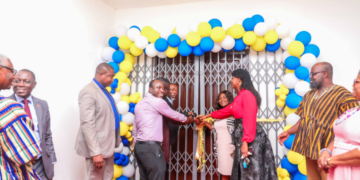The Graduates Students’ Association of Ghana (GRASAG) has dissociated from the National Union of Ghana Students (NUGS) over the contentious e-levy proposed in the 2022 Budget Statement and Economic Policy.
In reading the budget on Wednesday, November 17, 2021, the Finance Minister announced the implementation of a 1.75 percent tax on all electronic transactions.
The Finance Minister also said that government services will be increased by 15%.
“Electronic transactions covering, mobile money payments, bank transfers, merchant payments, and inward remittances will be charged at an applicable rate of 1.75 percent, which shall be borne by the sender, except inward remittances which will be borne by the recipient,” Ken Ofori-Atta announced.
Despite popular outrage, NUGS defended these rules in a press conference on Thursday, November 25, 2021.
The e-levy, according to NUGS, is a “step in the right direction” that will assist the government to generate cash to combat youth unemployment in the nation.
GRASAG, on the other hand, has rejected NUGS’s viewpoint.
According to GRASAG, the viewpoint does not represent the views of the whole student population.
It said, among other reasons, that if the charge is enacted, it would have a detrimental effect on internet firms, making them uncompetitive.
“The avoidance of electronic transactions will have a negative effect on online businesses mostly owned by the youth who rely on electronic payment methods.”
“This levy will make their products uncompetitive as they become more expensive in the eyes of the public, who will have to beat the additional 1.75% levy,” GRASAG said in a press statement issued on Thursday.
The NUGS press release was allegedly “signed without the consent of the President or any of the persons constitutionally mandated to carry out such duties on behalf of the President of the Association or the National Executive Committee of GRASAG-National.”
“The President, therefore, dissociates herself from this press release in no uncertain terms.”
Meanwhile, Parliament will wrap up its discussion on the 2022 Budget Statement and Economic Policy later today, Friday, November 26, 2021.
Ahead of that, the ruling New Patriotic Party (NPP) has said that Ghanaians would support the E-Levy and other levies included in the 2022 budget after they have a thorough grasp of these policies.
The party, on the other hand, claims that the government would hold taxpayers accountable for the use of E-Levy funds.
In an interview with Citi News, the NPP’s Communications Director, Yaw Buaben Asamoah, urged Ghanaians to embrace the tax and demand accountability.
“I will be the first to admit that governments after governments records on delivery of public services, public goods have not always been the best in terms of the expectations of the people, but sometimes it is also because of the short funding mechanism that is why you have so many government assets abandoned across the country.”
Read Also: New coronavirus variant reaches Europe
SOURCE: CITINEWS



























